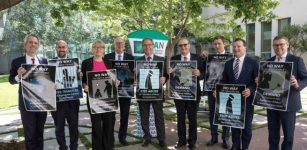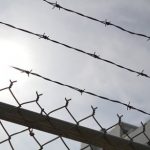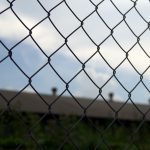End the Detention of Palestinian Children: An Interview with APAN’s Jessica Morrison

A nine-year-old Palestinian boy, who we’ll refer to as Ahmad, was detained by Israeli soldiers on July 26 this year. He was playing with friends near the Wall in the West Bank village of Zububa, when two Israeli soldiers chased him and fired stun grenades in his direction.
“When they caught one of my friends, I stopped running and they caught me,” Ahmad recalls. “They didn’t tell me why they were detaining me.”
Ahmad was taken to the courtyard at the Al Jalama checkpoint, where his details were taken. He was then placed in a dark room for about two hours, before being moved to another room with cameras. He was blindfolded and given a mattress to sleep on.
The boy was woken up hours later and driven to another checkpoint, where he was handed over to Palestinian police. Ahmad was released ten hours after his arrest, without knowing why his ordeal took place.
But Ahmad’s story is not uncommon.
Children in military detention
Each year, the Israeli military arrests, detains and prosecutes between 500 and 700 Palestinian children. And 60 percent of the minors sentenced to prison time are transferred from the occupied territories to prisons inside Israel in violation of the Fourth Geneva Convention.
The Military Court Watch site monitors these child detentions. It has a long list of testimonies. As you scroll through them, you find the majority of children are being arrested for throwing stones.
According to Israeli Prison Service data, there were 414 Palestinian children between the ages of 12 and 17 being held in military detention at the end of April this year. This was a 91 percent increase compared with the monthly average last year.
As of August 30, there were 319 children being detained.
One in five Australian MPs is calling for a halt to the practice
Last month, Labor MP Maria Vamvakinou put a motion to the lower house of federal parliament calling for the Australian government to raise the issue of Palestinian children being detained with Israel.
And on November 28, 49 federal parliamentarians from major and minor parties signed a joint letter urging the Israeli government to stop the mistreatment of Palestinian children arrested and improve the safeguards throughout the system.
This amounts to 20 percent of Australia’s federal lawmakers demanding an end to the systematic abuse of these children.
The move was organised by the Australia Palestine Advocacy Network (APAN). Established six years ago, the organisation is a network of civil society organisations and individuals advocating for the rights of the Palestinian people.
Sydney Criminal Lawyers® spoke with APAN executive officer Jessica Morrison about the plight of Palestinian children in Israeli detention and the network’s moves to put the issue on the Australian political agenda.
What’s actually happening to Palestinian children at the hands of the Israeli military?
For children in the West Bank, and in different ways in Gaza, the Israeli military is an omnipresent reality.
Many are stopped, searched and questioned on their way to school through checkpoints. Many are diverted from going home because of moving checkpoints, closed checkpoints, or roadblocks. It’s an intimidating and infuriating childhood for many.
The focus of our attention is those who are arrested and detained in Israel.
Conservatively, this is 500 to 700 Palestinian children a year, though reports are that this figure is increasing sharply.
In a report three years ago, UNICEF reported that ill treatment of children by the military system appeared to be “widespread, systematic and institutionalized.”
The typical pattern is that children are arrested in the middle of the night – often literally ripped from their beds, blindfolded and handcuffed – and taken into a facility inside Israel or an Israeli settlement, where they face interrogation without a family member or a lawyer.
They’re often held in solitary confinement at this stage, and encouraged to make a confession. 75 percent of children report physical abuse during this time, and a similar number report verbal abuse, humiliation or intimidation.
The Israeli military courts have a 99 percent conviction rate for Palestinians. So many children, plead guilty to get themselves out of military detention, as trials are usually a year wait or more, and bail is rarely granted. Children are then often imprisoned inside Israel, separated from family members.
And why are these children being put in detection? What’s leading to them being held in Israeli military prisons?
At least 80 percent of children are arrested under suspicion of throwing stones.
It’s not uncommon for Palestinians to throw stones at Israeli military infrastructure, such as checkpoints, tanks and guard towers. For many, it’s an act of defiance towards the military that control their lives.
There’s also very little evidence, if any, of these accusations however. I have watched soldiers examine the hands of young boys, and if they’re dirty to accuse them of throwing stones.
What sort of conditions are these children facing in detention?
There are many concerning reports about how children are treated. Over two-thirds are strip searched. At least a third are shown or made to sign documents in Hebrew – a language they don’t understand. And over 15 percent are held in solitary confinement for more than two days.
Child detainees spend an average of 18 to 20 hours per day inside their assigned shared cell, including meal times. In the winter, children told Defence for Children Palestine that the prison is often very cold, and the allotted blankets and heaters are insufficient.
The military court processes themselves are often the most traumatic. John Lyons talks about watching a conveyor belt of children paraded through and all pleading guilty.
Despite some improvements, many children are still given documents to sign in Hebrew.
With so many children imprisoned within Israel, the isolation from families is a major problem, with International Committee of the Red Cross facilitated visits often taking months to organise.
What about Israeli children living on the West Bank? Are they facing similar treatment in the Israeli justice system?
Israeli children who live in the West Bank are treated under a whole different legal structure. One piece of land, two different sets of rules.
For example Palestinian children can be held in custody for twice as long before seeing a judge and be remanded in custody for twice as long before trial. They can be imprisoned at 12 years of age, 2 years younger than an Israeli child.
What we’re asking is for Israel’s military orders to match the safeguards and protections given under their civil law. The Israeli military courts themselves have advocated for a much more equalizing situation.
Israeli Military juvenile court judge Sharon Rivlin-Ahai has said “The military courts have more than once voiced their opinion that every effort must be made, subject to the unique circumstances of the Area, in order to equalize, inasmuch as possible, the situation concerning minors in the Area to the situation in Israel.”
And in the context of international law, which laws are the Israeli state contravening?
There is a range of international law that is believed to have been broken by their behaviour.
Transfer of Palestinian detainees, including children, to prisons and interrogation and detention facilities inside Israel, is in breach of Article 76 of the Fourth Geneva Convention.
Israel’s use of detention without charge – administrative detention – has raised the concerns of many international bodies. Article 9 of the UN Universal Declaration of Human Rights states that “no one shall be subjected to arbitrary arrest, detention or exile”.
The UN Human Rights Committee in 2010 expressed concern at its “frequent and extensive” use, and recommended that Israel refrain from using the procedure against children.
The UN body overseeing the rights of the child has expressed concern that the Convention against Torture, and the International Covenant on Civil and Political Rights are regularly breached by Israel.
During its initial review in 2002, the Committee on the Rights of the Child – the UN body that monitors implementation of the Convention of the Rights of the Child – expressed serious concerns regarding “allegations and complaints of inhuman or degrading practices and of torture and ill-treatment of Palestinian children” during arrest, interrogation, and detention.
In July 2013, the committee found that Palestinian children arrested by Israeli forces were “systematically subject to degrading treatment, and often to acts of torture” and that Israel had “fully disregarded” previous recommendations to comply with international law.
How would you say the treatment of Palestinian children by the Israeli military, is symptomatic of the Israeli and Palestinian conflict as a whole?
The power disparity between Palestine and Israel is illustrated by the interaction between a fully armed group of soldiers and a young child.
In the Biblical story of David and Goliath the throwing of stones brings liberation from the oppressor, but it doesn’t here.
Palestinians live at the complete mercy of the Israeli systems, with those who would abuse Palestinians facing almost complete impunity.
At the end of last month, a motion was put to the lower house of federal parliament by Labor MP Maria Vamvakinou regarding this issue. Can you outline what the motion involved?
The motion called on Israel to act on the clear evidence that their systems systematically abuse children.
It was back in 2011 that John Lyons first exposed this situation in the Australian. And it has been three years since UNICEF called for urgent action.
However, while a few minor face-saving policies have been instituted, there has been no substantive change. Night arrests continue. Abuse continues. Transfers into Israel continue.
And APAN worked in partnership with 49 parliamentarians, who signed a joint letter urging the Israeli government to end its military detention of Palestinian children.
What did you think of this result? And what impact do you think this move will have?
We now have 52 signatories, which we are very encouraged by.
As one of the signatories said to me, supporting Israel doesn’t need to mean supporting it to breach international law.
As our drinking ads have so powerfully told us, when our mates are misbehaving, we need to ask them to pull up. As Australia is one of Israel’s closest international allies, we must ask them to pull up.
This year there has been action in the US Congress, debate in both UK Houses of Parliament, and now this statement in Australia.
This is a serious spotlight, and we hope that Israel will move to change its most egregious practices.
And along with ending the Israeli practice of detaining Palestinian children, what else do you want to see change in the region?
The reason we focus on children’s rights, is that it’s one of the most dramatic effects of living under military occupation. But the occupation itself must end.
Next year will mark 50 years of Palestinians living under occupation in the West Bank and Gaza, and millions are still stateless citizens. We must end the occupation and ensure Palestinians also have a homeland, as well as Israelis.
What’s the next move for APAN?
It’s been announced that Israeli prime minister Netanyahu – who’s overseen some of the most draconian policies Palestinians have seen in a very long time – will be in Australia in February.
We’re working with a range of other groups hoping to ensure that our concerns about Israel’s policies are raised with him. And we’re planning some protests in Canberra.
And lastly, how can people in Australia make an impact on the situation in Palestine and Israel?
In Australia, we’ve traditionally heard much more of an Israeli perspective, than a Palestinian one.
What Australians can do to help is to educate themselves about the Palestinian perspective.
What we’re looking to do is to have a balance of perspectives that we don’t think Australia’s got.
Thank you so much for speaking with us today Jessica. And good luck with the protests in February.
No worries. And thank you very much.







